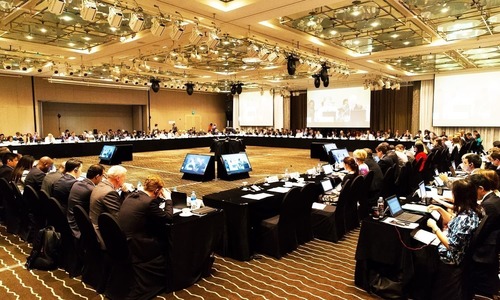THE latest message from Paris is unmistakable. The tone of the Financial Action Task Force on the conclusion of its plenary indicates how seriously the world is taking Pakistan’s inability to meet global anti-money laundering and counterterrorism financing standards.
Read: Pakistan escapes FATF blacklist, but gets warning
These concerns were voiced in so many words by the FATF president when he noted: “Pakistan needs to do more [to fix the weaknesses in its anti-money laundering/combating financing for terrorism regime] and it needs to do it faster. Pakistan’s failure to fulfil the FATF global standards is an issue we take very seriously.”
Then followed the warning, perhaps the first since Pakistan was placed on the FATF grey list in June 2018 for an intense monitoring process that the country has only until next February to make “significant progress” on.
It must do this across the full range of the 27-point national action plan agreed on with FATF, or risk action which could include Pakistan being blacklisted along with countries considered a haven for terrorism financing.
The outcome of the plenary is quite the opposite of what ministers and officials had projected.
Contrary to official claims, Pakistan has missed the third deadline for implementing the measures required to exit the grey list. Only five of the 27 measures — which include identification and supervision of terror-financing risks and boosting control on illicit currency movement — have been ‘largely’ addressed. Sadly, the government has never cared to publicly share the document. It is, however, unclear if FATF rules bar it from making the plan public or if it is keeping it a secret for some other reason.
Indeed, FATF also acknowledges the progress made by the country towards improving its AML/CFT regime, but didn’t find it adequate enough to let it off the hook.
It underlines that Pakistan hasn’t adequately demonstrated “proper understanding of the transnational terror-financing risks posed by terrorist groups” [operating from its territory] and conducted supervision on a risk-sensitive basis.
FATF requires Pakistan to deliver on its commitment to crack down on terrorism financing by fixing the strategic deficiencies in the AML/CFT regime such as identification of cash couriers, enforcement of controls on illicit currency movement, effective implementation of financial sanctions against all internationally designated terrorists and militant groups, as well as their agents.
Failure to meet the February deadline for making “significant and sustainable progress” will put the country on the blacklist and have serious consequences for its struggling economy, including tough sanctions on its banks and a freeze on official and private capital inflows.
The time to linger on Pakistan’s commitments has passed. It is now time to walk the talk if the country wants to escape being blacklisted or even get another extension to comply fully with the global AML/CFT standards after the expiry of the current deadline.
Published in Dawn, October 20th, 2019















































